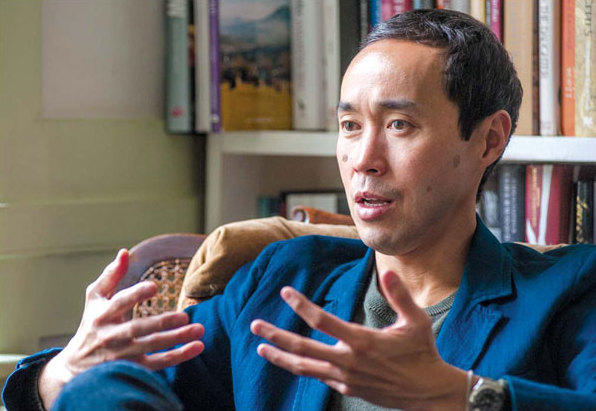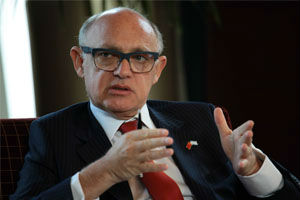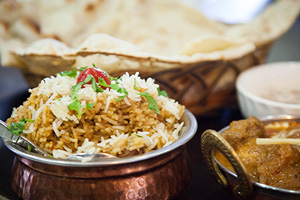Five-star dream
Updated: 2013-11-19 07:50
By Andrew Moody (China Daily)
|
|||||||||||
Award-winning author Tash Aw's latest book, Five Star Billionaire, paints a contrasting picture of China to the binary impression of the country that most people hold. Andrew Moody reports.
Tash Aw says that for many people, China is now replacing the United States as the "promised land" to go, live and pursue their dreams. The 41-year-old Whitbread prize-winning Chinese-Malaysian novelist argues the world's second-largest economy now offers that sense of opportunity that New York had at the beginning of the 20th century. "I would say that for many people now, particularly Southeast Asians, China is replacing America as the promised land," he says.
"For a lot of Malaysian-Chinese, the No 1 choice now would be China."
Aw was speaking on the top floor of the Georgian offices of his literary agent in London's Covent Garden about his third and latest novel, Five Star Billionaire, which is set in contemporary Shanghai.
|
Tash Aw says being of Chinese origin has had a bearing on the way he writes. Nick J. B. Moore / China Daily |
It follows the complex interactions between five characters, all of them Malaysian from a lowly salon worker to a shadowy billionaire author of a self-help book, from which the book gets its title.
The novel, perhaps the leading fiction work about China published in the West this year, is seen by many critics as a comment on modern Chinese society with some arguing it shows up a certain superficiality beneath the edifice.
"I've heard a few people say that to me. I disagree with that reading. I was very careful not to make any judgment. I wanted the book to reflect essentially what I think of China.
"The book is not a judgment on materialism or money. Money is ultimately very empowering for the characters. They just have to negotiate their relationship with it."
Aw had two writers' residences in Shanghai, in 2009 and 2011, while writing the novel and had the opportunity to experience Chinese society itself.
"The moment I arrived there, I was so excited to see the things that were happening there, both the good and the bad. It was so unexpected for me, this whole melting pot and a sense that barriers were crumbling and the possibilities were limitless or, at least, that is the illusion one has."
The author says this is in marked contrast to the often binary picture of China that even many educated people in the West hold.
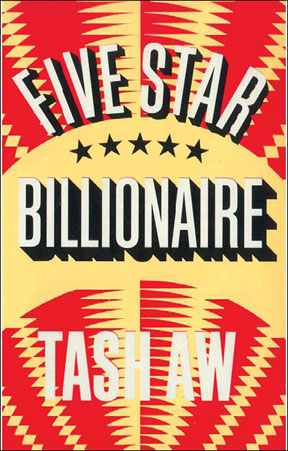
Aw, the son of an engineer, was born in Taipei, and was brought up in Kuala Lumpur, but his Chinese connections are deep-rooted.
"On one side my grandparents left China in the 1920s when they were children and on the other side, they left the generation before that. So you know, they are not ancient ancestors," he says.
He went on to study law at Cambridge University but on completing his degree moved to London to become a writer.
"I had a few friends and we were all writing novels. There was a sense of camaraderie. We worked in the British Library every day. I sat in the row where Karl Marx is believed to have sat," he says.
He says eventually "reality kicked in" and he was forced to get "a proper job" so he trained and worked as a solicitor with law firm Simmons & Simmons in London.
"This period really made me question whether I wanted to be a writer or not. When you work full time, the last thing you want to do when you come back in the evening is write a novel. I realized then this need to write was not something I was simply messing about with. It was a need, a quest, something fundamental to my existence."
Aw quit his job and managed to get a place on the MA creative writing course at the University of East Anglia, which has produced writers such as Ian McEwan and Kazuo Ishiguro.
"You can't teach people to write. Someone can write or they can't write. But what a creative writing course does is teach you to think about how you write and why you write. That's really what I found," he says.
Aw finished his first novel, The Harmony Silk Factory, set in wartime Malaysia, which reportedly won him an $800,000 advance, although the author has always denied this. It was also long listed for the Man Booker Prize and won him the Whitbread First Novel and a Commonwealth Writers Prize for Best First Novel.
Aw says what motivated him was that much of the literature published in English about his part of Asia had been written by Westerners such as Somerset Maugham, Anthony Burgess and J. G. Farrell.
"It (the existing literature) conjured up certain images. It conjured up planters, white men living a quite elegant lifestyle. It was not in anyway authentic to my experience," he says.
Five Star Billionaire also stands out by being a high profile title set in contemporary China since few Chinese novelists get translated into English with exceptions such as recent Nobel Prize winner Mo Yan.
"There is a lot of interesting stuff going on in China," he says.
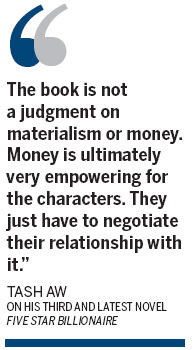
"The contemporary Chinese literature scene suffers globally because there is a real problem with getting works translated. There are some very prominent, notable translators but they are totally over-worked. So all these interesting books that have been written in China are just totally invisible."
One of the main characters in Aw's novel is Walter Chao, who has written a self-help business book, Secrets of a Five Star Billionaire. All the chapters in Aw's book are headed by Chinese idioms such as "Move to where the Money is" and "Perform all Obligations and Duties with Joy."
"Chinese people love these idioms, which are normally four characters. I had the idea of using them in an ironic way. They appear to be giving you straightforward advice but the chapter that follows each of them puts them in a different light and is opposite to what the idiom says."
Phoebe, an erstwhile lowly beauty salon worker and the only character in the book that passes herself off as a Chinese citizen, is inspired by Chao's book, and at one point she buys a high quality but fake handbag to make a statement about herself.
Aw says he is not being critical of Asians who often spend a high proportion of their salary on luxury items but says it is interesting to ask the question why they do it.
"What is going on inside them that makes them want to do that? What does the rest of their life consist of that makes them prepared to do that?"
The author says there are many aspects of modern China that are actually very American.
"The Chinese and the Americans have always seen themselves as polar opposites of each other but there are big similarities. It really struck me how the Chinese have seized on this very American thing about how you can improve every aspect of your life by reading a book," he says.
"In the UK or Europe, people have this attitude that 'that's your lot' and you have to put up with it. I find this new attitude (of many Chinese people), so optimistic. It might be a bit naive but it is also touching."
Aw says being of Chinese origin has certainly had a bearing on the way he writes.
"It's incredibly important. When I was growing up I thought it was not important at all. I just totally identified as a Malaysian," he says.
"I didn't wake up in the morning thinking I am Chinese but increasingly - particularly over the last 10 years - I am more aware of it."
Contact the writer at andrewmoody@chinadaily.com.cn.
(China Daily 11/19/2013 page22)
Today's Top News
China mulls roadmap to tackle climate change
China's FDI edges up 1.2% in Oct
Stocks warm to reform plan
Nation braces for more babies
Polluters still flouting law: inspection
Property prices rise in October
China shares have biggest daily gain in 2 months
Xi meets former US president Clinton
Hot Topics
Lunar probe , China growth forecasts, Emission rules get tougher, China seen through 'colored lens', International board,
Editor's Picks

|

|

|

|

|

|
